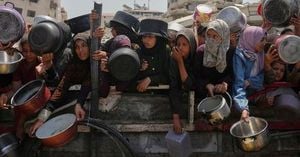On August 9, 2025, the governments of Australia, Canada, and the United Kingdom issued a rare and forceful joint statement condemning what they described as ongoing repression and human rights violations in Belarus. The timing of this coordinated message was no accident: it came just a day after a Belarusian journalist was convicted of treason and revealing state secrets, receiving a decade-long prison sentence in a closed trial, as reported by the Associated Press. The conviction landed on the eve of the fifth anniversary of Belarus’s disputed 2020 presidential election, a pivotal moment that has continued to reverberate across the country and the international stage.
“We — Australia, Canada, and the United Kingdom — stand united in condemning the ongoing repression and human rights violations,” the three countries declared in their statement, according to SRN News. They did not mince words, highlighting that “thousands have been unjustly detained, subjected to torture, or forced into exile.” The statement called these actions “a flagrant breach of Belarus’ international law obligations and a serious violation of human rights and fundamental freedoms.” The joint appeal urged Belarusian authorities “to end their campaign of repression.”
For many observers, the latest conviction of a journalist — whose name has not been released by authorities or media groups, likely due to fears of further retaliation — is emblematic of the relentless crackdown on dissent that has defined President Alexander Lukashenko’s tenure. According to the Associated Press, the sentencing was part of a broader campaign to silence independent voices, especially as the country marked five years since the 2020 election that kept Lukashenko in power and sparked mass protests across Belarus.
President Lukashenko, a close ally of Russian President Vladimir Putin, has ruled Belarus with an iron grip for more than three decades. His re-election in January 2025 for a seventh five-year term was met with little surprise, but much consternation among opposition figures and Western governments. The 2020 election, in particular, remains a flashpoint: opposition leaders and numerous Western nations have long accused Lukashenko of stealing the vote, which led to some of the largest street protests in Belarusian history. Those demonstrations were crushed with force, and all of Lukashenko’s leading political opponents were either jailed or forced into exile, according to SRN News.
The numbers are staggering. As the joint statement from Australia, Canada, and the UK detailed, thousands have faced detention, torture, or exile since the crackdown began. Human rights organizations estimate that nearly 1,200 political prisoners remain incarcerated in Belarus as of August 2025, despite the release of several hundred people convicted of extremism or politically related offenses since mid-2024. These releases, analysts suggest, may be a calculated move by Lukashenko to ease his growing isolation from the West, but they have done little to address the broader concerns about ongoing repression.
Australia, Canada, and the United Kingdom did acknowledge the recent releases of some political prisoners, stating that they “welcomed the recent releases of several political prisoners in Belarus.” However, their message was clear: these gestures are not enough. The three governments remain “concerned by what they termed as continued arrests and persecution of individuals for exercising their human rights,” as reported by SRN News.
For many Belarusians, the story of the convicted journalist is all too familiar. The closed nature of the trial, the severity of the sentence, and the charges themselves — treason and revealing state secrets — reflect a pattern of judicial proceedings used to silence critics and instill fear in the broader population. According to the Associated Press, this case is just the latest in a series of prosecutions targeting journalists, activists, and anyone suspected of opposing Lukashenko’s rule.
Internationally, the conviction has drawn swift condemnation. Media freedom organizations have decried the use of treason charges against journalists as a particularly egregious tactic, one that not only punishes the individual but also sends a chilling message to others who might dare to report on government abuses or challenge the official narrative. The fact that this sentence was handed down on the eve of the anniversary of the 2020 protests only underscores the government’s determination to quash any lingering dissent or commemoration of those events.
The Belarusian government, for its part, continues to deny that political prisoners exist within its borders. President Lukashenko and his officials have repeatedly insisted that all those detained are criminals or extremists rather than victims of political persecution. This stance has done little to convince Western governments or human rights monitors, who point to mounting evidence of systematic abuses, including arbitrary arrests, torture, and the forced exile of opposition figures.
Since the disputed 2020 election, Belarus has become increasingly isolated on the world stage. The European Union, United States, United Kingdom, Canada, and other countries have imposed multiple rounds of sanctions on Lukashenko’s regime, targeting senior officials, state-owned enterprises, and sectors linked to the government’s security apparatus. However, with Russia’s steadfast support, Lukashenko has managed to maintain his grip on power, even as the country’s economy and civil society have suffered under the weight of international isolation and internal repression.
Human rights groups continue to sound the alarm about the ongoing crisis. They argue that the recent releases of some political prisoners, while welcome, do not signal a genuine shift in policy but rather a tactical move designed to placate international critics without fundamentally altering the government’s approach. As one international observer put it, “The release of a few does not erase the suffering of the many who remain behind bars, nor does it change the underlying reality of repression.”
For many in the West, the situation in Belarus is a test of the international community’s commitment to upholding human rights and democratic principles. While statements and sanctions have demonstrated a degree of solidarity with Belarusian civil society, the effectiveness of these measures remains in doubt as long as the government continues its campaign against dissent with little sign of relenting.
The conviction of the journalist and the continued detention of nearly 1,200 political prisoners serve as stark reminders of the challenges facing those who seek to speak truth to power in Belarus. As the world marks five years since the 2020 election and its aftermath, the calls for justice and accountability have only grown louder — but so too has the resolve of a regime determined to silence them.
As international pressure mounts and the Belarusian government faces growing scrutiny, the fate of political prisoners and the future of civil society in Belarus hang in the balance. The world will be watching closely to see whether the calls for an end to repression will be met with meaningful change or yet another round of crackdowns and closed trials.



